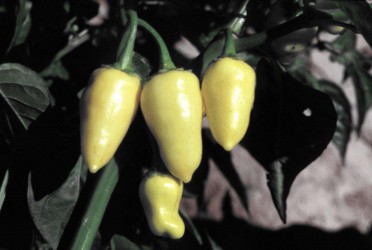Publications
Home Vegetable Gardening in New Mexico
Growing Zones, Recommended Crop Varieties,
and Planting and Harvesting Information for
Home Vegetable Gardens in New Mexico
These publications provide general information for growing vegetables in home gardens in New Mexico. Circular 457-B includes a map showing New Mexico growing zones, as well as a table providing crop variety recommendations, recommended planting dates, days to harvest, planting instructions, and yield information.
Growing Chile Peppers in New Mexico Gardens
Chile peppers (Capsicum spp.), including bell peppers, exhibit a wide variety of shapes, sizes, colors, and flavors (Figure 1). The term “pepper” should not be confused with “black pepper” (Pipernigrum), which is produced from the dried, unripe fruit of a vine grown in the tropics.
Red Chile and Paprika Production in New Mexico
New Mexico is the leading state in chile acreage (non-bell pepper, Capsicum annuum), and red chile and paprika represent approximately 40% of the state’s overall production. Red chile is derived from New Mexicantype chile varieties that are harvested when fruit have turned red or when they have reached physiological maturity. Paprika is a type of red chile and is the designation used for low (or no) heat, red Capsicum annuum varieties (Wall, 1994). Paprika varieties are also distinguished by their high levels of red pigments (capsanthin and capsorubin) in the pericarp (walls) of the fruit. The majority of the red chile and paprika crop is dehydrated and crushed into flakes or powder for use in a wide variety of products. Approximately 15% of the paprika crop is further processed into oleoresin paprika, a natural red food colorant (Walker, 2007).

New Mexico Chile Association/NMSU Chile Task Force Publications
The College of Agricultural, Consumer and Environmental Sciences is aggressively involved in finding solutions to current problems in New Mexico. The Water Task Force, New Mexico Chile Association, and Range Improvement Task Force are interdisciplinary teams of researchers, scientists, and other experts that conduct commissioned studies and other work.
College of Agricultural, Consumer and Environmental Sciences (ACES) Publications
ACES publications provide practical, research-based information to help improve your life. They are available in HTML, PDF, and eBook formats for viewing on a wide variety of devices. Printed copies of certain publications may also be available at your County Extension office.